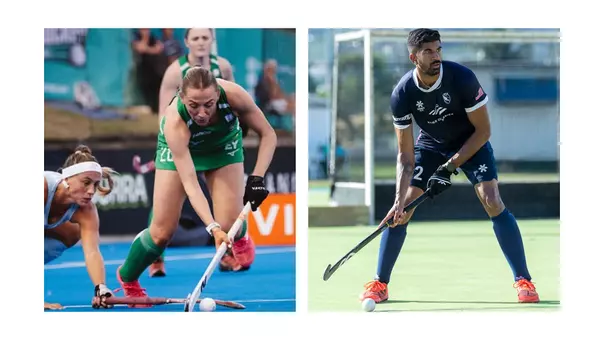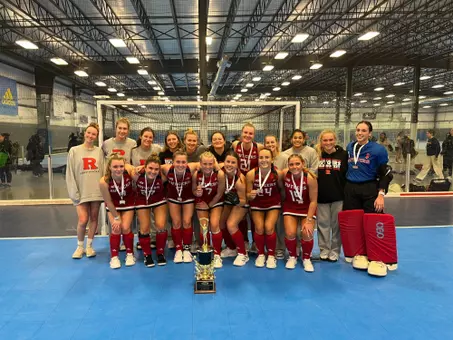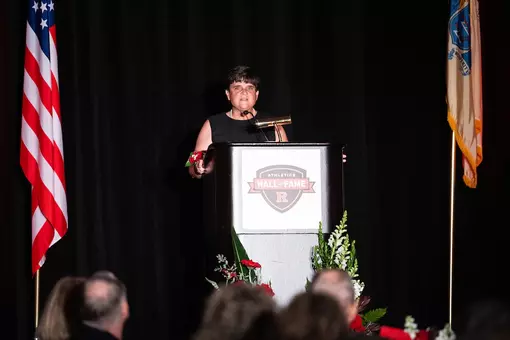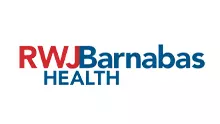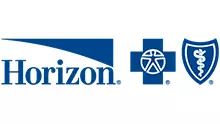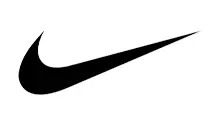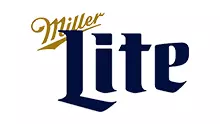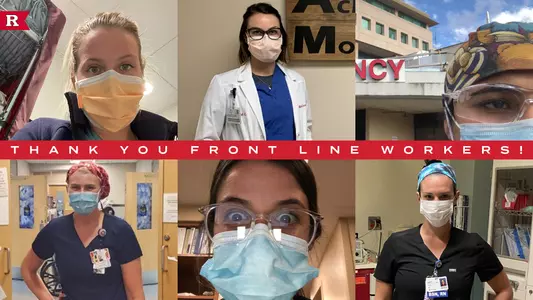
Field Hockey Alumnae on the Front Lines of COVID-19 Pandemic
Jun 18 | Field Hockey
As the COVID-19 pandemic struck the world, the message was spread to stay home as social distancing policies were enacted to help slow the spread of the virus. However, a number of individuals were deemed as essential workers and continued about their lives. None were more directly impacted than those in healthcare, who continued to go in to work every day, spending time in hospitals to take care of the sick, continuing to persevere through new challenges to provide others with the best possible care.
Rutgers field hockey is externally grateful for all of the healthcare workers who are on the front lines, which includes multiple alumnae of the program who are now working in nursing. ScarletKnights.com spoke with six such former Scarlet Knights to get an insight into their careers and how the pandemic has impacted their lives.


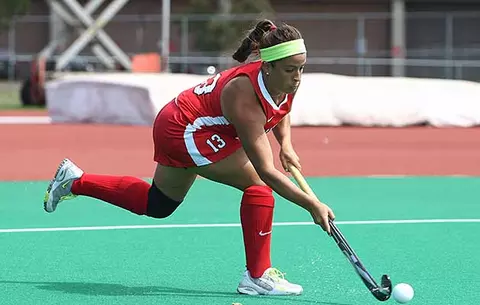
Played in 75 games over four seasons (2010-2013) with 66 starts between forward and midfield. Scored 14 goals and adding 14 assists for 42 points. Had two game-winning goals in 2012. Played in the Young Women’s National Championship. Two-time All-BIG EAST Second Team selection, three-time Big East Offensive Player of the Week and three-time member Academic All-Conference.



Played in 30 games at back between 2010 and 2013 making five starts and had two assists. Three-time Academic All-BIG EAST selection earned the team’s Spirit Award in 2010.



Played in 74 games at back over four seasons (2010-2013), starting 69 contests. Scored four goals, including a game-winner in 2013. She also had seven defensive saves. Was named to the BIG EAST All-Tournament Team in 2010.

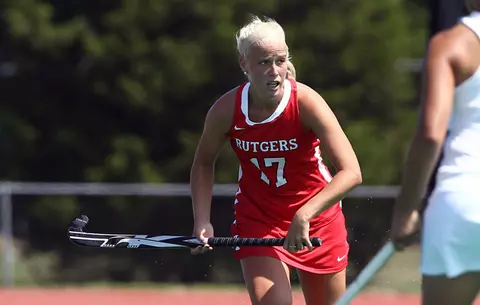
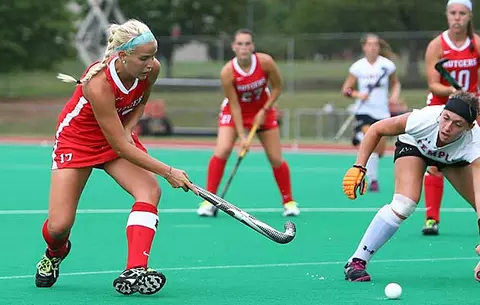
Played in 73 games at forward from 2009-2012, making 63 starts, and scored 11 goals and had 11 assists for 33 points, with one game-winning goal.



Played in 51 games at back over four seasons, starting 38 of them. Two-time All-BIG EAST Academic selection.
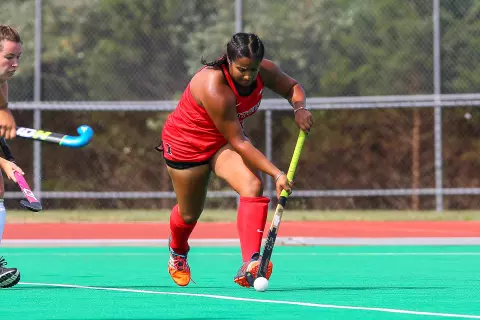
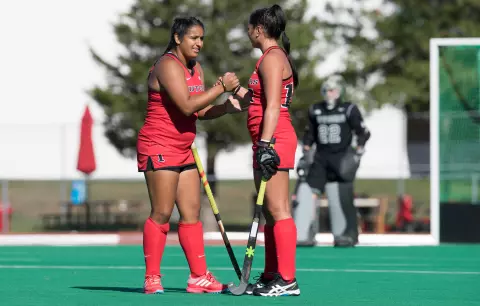
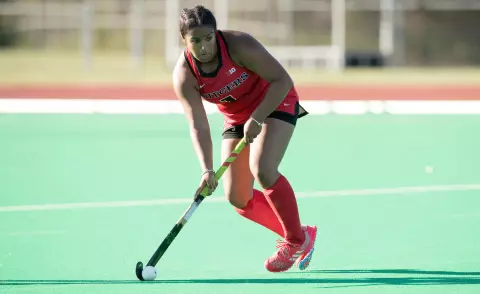
Played in 70 games at back over four seasons (2013-2016), starting 67 of those, and scored 15 goals and added 19 assists for 49 points. Had four game-winning goals and four defensive saves. Is eighth all-time at Rutgers in assists with 19. Was a Second Team All-BIG EAST and All-Region selection in 2013. In 2014, earned Second Team All-Big Ten and First Team All-Region honors. Was Rutgers’ Sophomore Female Athlete of the Year in 2014.
The pandemic has presented a lot of new challenges for these alumni in their work routines. In addition to the disruption to the normal daily life, this was especially present in the lives of those working to combat the virus. From the focus on personal protective equipment to retooling routines and rapidly retooling strategies, it has been a challenging time for those on the front lines.
__________
Rose: “Physically, wearing the N95 mask for 12 hours is pretty brutal. It takes a lot longer to accomplish tasks because you have to completely garb up before entering a patient's room. It's not easy to breath, it's hot but worth it to be protected. Mentally, watching patients die alone without their families with them is heartbreaking and something you don't get used to.”
Rouh: “The pandemic has shifted the hospital's daily operations. They had to move units around designate a "COVID-19" floor. Many pre-admissions and non-emergent surgeries were cancelled or postponed. Every patient is assumed to be co-vid positive until they are tested negative, so lots of PPE is required. Every single person in the hospital must have a mask on at all times, which is tough adjustment. Wearing a face mask for 12 hours can be painful. The hardest part is the unknown. We don't know when there will be a vaccine, if there will be another wave that has more consequence, or if there are more viruses out there.”
Patrone: “I'm anxious when I get to work, it’s nerve wracking not knowing whether or not I’ll have COVID patients. Prior to all this, there was a scientific method to everything we were doing. Everything we do in nursing had been based on evidence based practice. And that’s not what’s happening right now. Every week there’s new things coming out, policies being changed, patients presenting differently. So that’s a bit scary and different.
Sawasky: “This has changed medicine for the foreseeable future. It’s sad, it’s scary. It’s affecting all types of people. And we don’t know everything about the virus. We’ve had to be creative about the flow of the ER and our spacing. Normally when something goes wrong, a ton of people rush into the room. Now, we have to take a second, put on a mask and goggles and figure it out. We’re protected as best as we can, we have to reuse masks at times, but for the most part the hospital has done a good job keeping us protected. Don’t worry – I’m wearing my Scarlet Knights cap! I like to tell everyone up here about it, I’m still really prideful of being an alumn.”
Walia: “Being a new nurse in this situation, it’s overwhelming. You’re already trying to learn new things and it’s a steep learning curve. And then there’s another pressure with the COVID aspects. When it comes to something like this, we need to be prepared, because that lack of preparedness has put us back a couple of steps when it came to this. The lack of PPE, ventilators, those need to be thought of. If we can enhance the public health principles when it comes to preparedness and preventative measures, we would be in a different place right now.”
It has been over three months since the pandemic became prominent in American society. As time has gone on, some progress has been seen, allowing places that were under lockdown to start to open up. Those on the front lines have been appreciative of the support they’ve received and hoping to see the light at the end of the tunnel.
__________
Rouh: “Things are looking up now though, as we are learning more about the virus. Elective surgeries have started again and clinics have opened back up. I love seeing patients get better. I enjoy the teamwork involved in the Intensive Care Unit. Every worker is essential to the well-being of the patient.”
Rose: “Watching patients improve is the most rewarding part for me, knowing your actions put them at ease mentally and physically.”
Patrone: “The support we’ve gotten has been great, people have been super nice, sending food. My managers is big in his church community, they’ve been so sweet. These people like will make us masks, so we can wear them in and out of the hospital, and they've like sending him gift cards so that he can buy us food. It’s really nice.”
Sawasky: “People have learned to listen to the medical professionals. I think the good that will come out of this is that healthcare is going to change for the better. It’s rewarding for me. People that have come in for simple things in the ER during this, they have been so thankful and appreciative, they’ve donated tons of meals. To see how people have stepped up has been nice.”
Plouse: “The area where I’m in, we are starting to open back up again. We have a huge backlog of elective surgeries that we are trying to safely transition in to the office, but implementing a ton of changes for patients.”
Walia: “We have a lot of people sending food to the hospital staff, providing housing. It’s great to feel appreciative, but we have to remember that this work that we’re doing, we’ve been doing that all the time. We don’t deal with viruses like this on a daily basis before the pandemic, but we do deal with a lot of different types of viruses and sickness, and that’s mentally and physically draining. It’s also really rewarding being able to deal with patients one-on-one, helping them and sending them on their way. Making sure that they are safe and that the hospital is a safe place for them as well. That’s one of the most rewarding experiences.
A number of these alumns in healthcare are former teammates, who have maintained their bonds and friendships first established ‘On the Banks’. This is now strengthened by information sharing, collaborative discussions and idea sharing for how to best handle being in these positions during an unprecedented crisis.
__________
Rose: “A couple of us text every single day, pretty much all hours of the day. I'm also lucky to live close by to two of my best friends and former teammates. Of course social media helps us all keep up with each other.”
Rouh: “I still keep in touch with many of my friends and teammates from Rutgers. They are lifelong relationships that I deeply value. My husband, a former member of the Rutgers lacrosse team, and I still follow many of the athletic teams and try to make it up for games when we can.”
Patrone: “Laura Rose and I work for the same health system. We’ll talk about what’s going on and our different experiences so we can get a better understanding. I talk to her and Katie Plouse almost every day, just talking about work and our experiences are relatable. Katie’s husband is a PA too working on the front lines as well, so I can pick his brain about what his hospital system is doing.”
Plouse: “It’s been a cool experience to talk to some former teammates about this as it’s gone on. I’m in the Harrisburg area, which wasn’t hit as hard, then I’d talk to Lisa Patrone and Laura Rose in New Jersey that got hit harder than we did. It was pretty interested and also a nice way to just vent and talk to other people about things that are going on, compare how our different hospital systems were handling it, how different people were handling their patients. That was good information that I definitely used in my work. My Rutgers friends are still some of my best friends now, and it’s been great to have their support.”
Sawasky: “I’m getting married next October and I’ll have four former teammates in my wedding. I love Rutgers and I’m a diehard. I’ll tell everyone that Rutgers is the best school on Earth and how great it was. I’m super thankful for the bonds that I made with my teammates over those years. We were 18-19 year olds, and going on 30 now we’re still talking all the time.”
For these former Scarlet Knights, their time at Rutgers was instrumental in developing their character and preparing them for life after college. The principles of teamwork, communication, perseverance among many others all are translatable to being successful postgraduate career.
__________
Rose: "Rutgers taught me teamwork first and foremost. If you aren't willing to help one another in this field you won't make it very far. Also perseverance, some days are not easy, you have to be mentally tough. Mental toughness was definitely preached at Rutgers."
Rouh: “Rutgers shaped who I am as a person. As a student-athlete, you learn how to deal with stressors and overcome hardship. You learn how to manage your time and rely on others when you need help. This all correlates to a career in healthcare.”
Patrone: “I think communication is a huge thing, the communication confidence aspect. Playing a sport gave me the knowledge that if I'm not comfortable with something and it doesn't sit right with me, I don't have a problem speaking up about it. And especially with all this going on, if you feel at risk, you need to speak up about that. I think that Rutgers helped me with that confidence and that I'm able to communicate myself in an effective way but also still standing my ground. I feel like it's just a different mindset, that you can tell people who had that type of background, and people notice it without me even saying anything. It's a different mentality, when you're done yourself and someone else needs help, you go and help them and get things done. I don't think that people who weren't part of something bigger than themselves or part of a team fully understand the importance of that.
Sawasky: “I’m thankful for everything field hockey brought us through. The adversity, it’s cliché but it really does prepare you for nursing. It prepares you for life in general, overcoming stressful circumstances. In the ER, you have to be calm but you have to be direct. Those are all lessons that I had learned when I was younger. I firmly believe that it all relates.”
Plouse: “Healthcare is such a team approach right now. Athletes definitely have a large advantage going into any job in the healthcare field, just with the experience of being a teammate and being able to communicate with and get along lots of different personalities to work together with a common goal. That’s been huge for me transitioning into a medical career.”
Walia: “I loved my time at Rutgers and all the teammates and friendships I made. It was a very positive experience and a time that I grew as a young person. One thing Rutgers gave me was the ability to listen to other people’s experiences and stories and keep them with you. Every day we see so many different patients from all walks of life. A lot of times at Rutgers, we came from different places, different high schools, different countries even. Coming on to one team, one campus, one school and sharing our experiences was one of the best things I’ve ever experienced. I hold Rutgers really close to my heart because it’s the place where I grew up and learned who I was. And that’s the greatest gift of all.”
With the benefit of experience, our alumni panel offered some wisdom for current student-athletes, especially those considering a career in healthcare. Our panel encouraged the next generation to take advantage of all the support that Rutgers offers in preparing for life after college.
__________
Rose: “Take your prerequisite science courses in the summer or whenever your off season is. Playing a Division I sport is a full time job by itself so make your life easier and take the tougher courses when you have more time to dedicate to them. If you have the opportunity, shadow a healthcare professional in whatever area you are interested in.”
Rouh: “For those student-athletes that think they want a career in healthcare, there are so many options. Healthcare is a rewarding- go for it!”
Patrone: “I think this is a career that is always going to be useful to the world, but it's also useful to yourself and those around you, because you know how to take care of yourself and other people. One of the big things that helped me make my decision to this is that if I’m going to go to work every day, I want to do something that I feels like I'm helping people and making a difference.
Sawasky: “All that hard work that went into playing the sports, all the good times and the tough times, it may not seem like it then, but if you can master that at 18-19 years old, you’ll be light years ahead of your counterparts when you get out of school and going for a job, especially in healthcare. Division I athletics really sets people apart.
Plouse: “Different careers are harder to get into then others, and grades are so important. It’s tough as a Division I athlete to keep that in perspective, because your sport is your job. (Head Coach) Meredith Civico always told us that we were student-athletes, and student was listed first for a reason. Rutgers did a really good job of preparing us and keeping us focused and centered on academics and our future.”
Walia: “Don’t shy away from doing what you want to do just because you are a student-athlete. Rutgers has a great support system in place. You might have to work extra hard, but that’s what dreams are made of. You have to work extra hard to get where you want to be. When it comes to nursing, Rutgers has an amazing school. A lot of my alumni friends went there and it’s an amazing place. To future Scarlet Knights – enjoy every single moment and take it in every minute because it goes by so fast. Rutgers is a large community with great people, branch out and don’t give up on yourself.”
